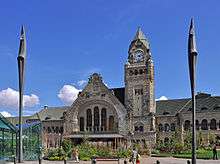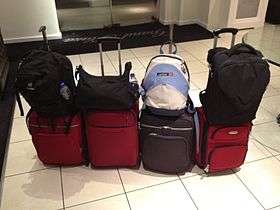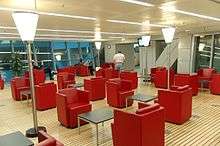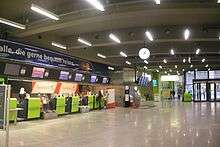Rail air alliances
Airlines and ground transportation companies both offer alternatives and complement each other in terms of providing you with means to get to your destination. In some cases, they also cooperate to offer more comprehensive and convenient travel solutions. This article covers three types of cooperations between airlines and ground transportation providers:
- Airlines using ground transportation as connections where it is less convenient or impossible to offer an extra flight segment
- Airlines and ground transportation providers offering promotional tickets for those combining a flight with a rail or bus ride
- Ground transportation companies transporting luggage from city centers to airports on behalf of airlines, providing the opportunity for city center check-in and luggage drop-off (instead of doing so at the airport only).
Apart from those special solutions, public ground transportation is available from almost every airport with scheduled service to the destination it serves, but regular public transportation connections are not covered in this guide.
Ground transportation as "flight segments"

Instead of offering flights from major hubs to some destinations, airlines sometimes choose to offer ground transportation by rail or bus bookable just the same way as a connecting flight. This means that the destination, which is a railway or bus station, appears in the booking system the same as an airport would, and the journey by bus or rail from an airport to such station can be booked just the same as a connecting flight, on a single ticket.
The railway connections are generally offered when the airport where the connection is to be made has its own railway station - usually it is one on a high-speed line, which provides travel times competitive with what a flight would. In case of bus connections, they are employed most often when the destination is too close to the airport or not popular enough to make connecting flights viable. Such rail or bus connections can only be booked as a part of a flight ticket, being one leg, or "stretch", of the journey - airlines do not generally offer flight tickets for bus or train rides only, and if they do, they tend to come at highly inflated prices. You can usually buy a separate ticket for such a journey from the ground transportation operator at a regular price if you do not wish to book it as a part of a flight.

Booking a ground connection
In order to be bookable as a destination in the GDS (Global Distribution Systems - ones that handle airline bookings), a train or bus station needs to have a three-letter IATA code, just like an airport would. This makes for a funny situation when train and bus stations appear in booking engines as airports. You can usually find them under a code beginning with "Q", "X" or "Z", as those letters are rarely employed as first ones in IATA codes for actual airports.
When booking, you can simply enter the IATA code for the station you wish to start or end your journey at, or enter the name of the destination to be prompted with such an option. When selecting an "all airports" option for a destination that has both an airport and a IATA-coded bus or train station, those will be included in search results. Other destinations might be bookable as such without outright notice, and only the flight details will reveal that they have no airport, but rather your first/final "flight stretch" will be realized by a train or bus.

Transferring between airplane flight and train or bus connection
While you are usually issued a standard ticket to your destination listing the transfer from the airport to the train or bus as a connection, instead of a boarding pass for the ground stretch you usually get some kind of a voucher to be presented to the personnel at the station or inside the vehicle in lieu of a bus or train ticket. Some of those are strictly restricted to a particular service departing at a particular time, just like a plane ticket would, while others offer the possibility to take any service on the date the connection is to be made.
One thing to mind is that checked luggage is usually NOT transferred automatically to the final destination. Unlike connecting flights, those connections require you to pick up your checked luggage after landing and carry it yourself onto the train or bus, as you would when normally changing from a plane to a train or bus. While dedicated bus services might wait for passengers that are supposed to transfer, train connections are usually made using general mainline services, which will run according to timetables and will not wait for delayed passengers.

Benefits for passengers
The benefit of using such a service consists usually in an attractive price, less than separate plane and rail/bus ticket. Sometimes, if the destination of the ground transportation stretch is less popular than the one with the connecting airport, the entire flight+ground segment might cost even less than a flight only to the airport where you would connect. Moreover, this saves you time you would need to research for and book your further ground journey. Finally, if there is an option of either flying to your desired destination or taking a combined flight-rail/bus option, the latter might be less time-consuming, as buses or trains may take less to cover the last leg of the journey, offer tighter connections and generally arrive at city centres, while airports tend to be on the outskirts.
Examples of air-rail or air-bus connections

Below is a list of different rail or bus connections to airports that are bookable as a flight or otherwise integrated with airline ticketing systems ordered by country
Austria
Austrian Airlines, in cooperation with Austrian railways (ÖBB) introduced a new service called AIRail in 2014. In essence you get a ticket for the train from Linz to Vienna airport with your Austrian flight. The train ticket includes some other benefits such as discounted parking for Miles&More members (free for Hon Circle) at Linz main station, check in already at the station (though no through-checking of luggage), bonus miles awarded for the train trip, a snack voucher for the train trip, as well as special benefits for business class passengers and those that have a higher miles&more status, such as traveling first class on the train or use of the lounge at Linz station.
Belgium

The Dutch national airline KLM, operating out of Amsterdam Airport Schiphol (AMS IATA), offers passengers travelling to and from Antwerp and Brussels in Belgium an option to complete the stretch from either Belgian city to AMS on the high-speed Thalys train, which stops directly at Schiphol (there is a large high-speed train station underneath the airport terminal). To travel that way, one needs to book the destination and/or origin as (ZWR IATA) for Antwerp Central (Antwerpen Centraal) train station and (ZYR IATA) for Brussels South train station. Travel times are 1h between AMS an ZWR and 1.5h between AMS and ZYR. Those Thalys connections are ticketed under flight numbers KL296x-KL297x, depending on the exact train being booked with the flight.
Do note that KLM also offers flights between Schiphol and Brussels National Airport BRU IATA, which are shorter than the train ride, but the airport is farther from the city center of Brussels than the train station. Depending on the day and destination, either option can result in a cheaper flight and/or shorter total journey. KLM allows one to search for both at the same time using the "Brussels all airports" option. Do note that flights between AMS and BRU are bookable separately via KLM, but the train is not.
For Antwerp, KLM used to offer a twice-daily bus service (flight codes KL320/KL321), taking 2.5h with the destination code the same (ZWR for Antwerp Central), as the buses depart and arrive right in front of the Antwerp Central station. As of 2015, this service is being discontinued and passengers are being rebooked to the Thalys trains. Antwerp also has an international airport, but it has no direct connection to Amsterdam.
Canada
AirFrance/KLM operate a shuttle bus service between the intercontinental Montreal-Dorval airport (YUL) and Ottawa Train Station (XDS), which can be used as a further flight leg for flights between Montreal and Paris CDG or Amsterdam Airport Schiphol. While XDS is a railway station, the connection is operated by bus as YUL has no train station. The bus connection takes 2 hours and the buses arrive and depart around 2 hours from the connecting flight, leaving enough time for meeting the intercontinental passengers and allowing for delays. The bus shuttle even has its own flight code with both airlines - KLM300/301 and AF7110/AF7113.
France
The national rail operator of France, SNCF, offers a service called TGVAir, consisting of a common booking of a flight ticket to/from the Paris Charles de Gaulle Airport (CDG) and train travel between the train station at the airport on a high-speed TGV train and selected train stations. Some destinations that can be booked with a train connection via CDG are Avignon (XZN), Brussels (ZYR), Lille (XDB), Lyon (XYD), Metz (XZI) Nantes (QJZ), Poitiers (XOP), Toulon (XZV) Tours (XSH) and Strasbourg again (but this time the destination is the railway station with the IATA code of XWG). Some of those destinations also have airports located away from the railway stations, under separate IATA codes. There is also a TGVAir solution available for flights to Paris Orly ORY IATA. As Orly does not have a connection to TGV lines, holders of TGVAir tickets are offered a free shuttle to the closest TGV station in Massy.
The list of airlines that offer TGVAir tickets is constantly changing, but they are by far the most popular with Air France, who is the largest proponent of the solution. In general, TGVAir is used by airlines flying long-haul to CDG or ORY with limited European presence, such as carriers based in the Middle East, Far East or in France's current or former overseas territories. European airlines other than Air France generally do not interline with SNCF.
Germany
Lufthansa offers a number of railway connections from its main international hub at Frankfurt Airport, which has a station on a high-speed line serviced by Deutsche Bahn's InterCityExpress (ICE) trains. The combined Lufthansa-DB service is called AiRail. You can book a Lufthansa flight to Frankfurt with a train connection to the central station in either Cologne (QXL IATA), Düsseldorf (QDU IATA), Kassel, Karlsruhe and Stuttgart (ZWS IATA). All of those cities also have international airports, and there are Lufthansa flights from Frankfurt to both Düsseldorf and Stuttgart just as well.
Lufthansa also offers bus connections to several other destinations from Frankfurt. Those include Kaiserslautern (KLT IATA), Saarbrücken Duderweiler Bus Station (SDA IATA) and Strasbourg Bus Station (XER IATA), operated by a dedicated bus shuttle. The bus ride to Strasbourg is rather long (2h 45min), but there is no direct air or rail connection. The other are shorter (between 1 and 2 hours). The bus-operated flight stretches are usually bookable with intercontinental flights operated by Lufthansa and can be impossible or very expensive to book with intra-European flights, but can be booked at a reasonable price (EUR 49 one way for Strasbourg, EUR 27 for KLT and SDA) separately as a Lufthansa "flight". Completing the bus journey booked by Lufthansa earns one at least 125 miles with Miles&More and counts as a flight stretch.
Japan
Emirates Airline does not serve the airport of Nagoya in Japan, but as the city is relatively close to the major Kansai International Airport near Osaka, a connection is provided by means of bus transfer to Nagoya JR Railway Station. The IATA code for booking this destination or origin is NGY IATA.
Netherlands
KLM, the country's flag carrier, is a veteran of ground-based "flight" solutions. In 2015, they reintroduced bus services to their hub at Amsterdam Airport Schiphol AMS IATA from the cities of Nijmegen and Arnhem. To depart or travel to or from Arnhem, while booking one needs to specify the origin or destination as QAR IATA for the Arnhem Bus Station, and for Nijmegen the code is QNQ IATA for the Nijmegen train station (this is where the buses stop, the travel is not by train).
There are two buses daily in each direction, taking 1.5h between Arnhem and AMS, with a further stop in Nijmegen another 30 minutes away. Flight codes are KL0305-KL0308, and the flights and above mentioned destination/origin codes tend not to show up in booking engines, but only when booking directly with KLM. The bus connection is not bookable separate from a flight to/from AMS.
Saudi Arabia
Dammam in Saudi Arabia is served by one of the world's largest airports (by area at least), but still some airlines offer the option of flying into Bahrain and travelling further to Dammam in 7-seater "limousine buses" over the 28 km causeway linking the Bahrain island with Dammam. This service is bookable on many airlines offering flights to the Middle East, even those operating direct flight connections to Dammam airport as well. The destination code for the bus travel is DMS IATA (for Dammam Bus Station).
Switzerland
Swiss offers a connection to Basel via Zurich Airport (ZRH IATA) called Airtrain consisting of a flight to Zurich and a ride on any of the c.a. 20 trains between ZRH and the Basel SBB station (ZDH IATA). This is bookable as a regular flight (flight numbers LX 74xx), although it tends to only show up as available when booking directly with Swiss. 1000 or 1500 Miles&More miles are credited for the train ride.
United Arab Emirates
Etihad, which has all its flights arrive at its Abu Dhabi Airport hub (AUH IATA), offers connections to the neighboring emirate of Dubai as well as the desert oasis city of Al Ain for their economy class passengers. Flights to Dubai or Al Ain would not make sense due to short distance, and there are no railway connections within the United Arab Emirates, so Etihad employs a fleet of luxury Etihad Express coaches shuttling around the clock (to meet flights departing at all times of the day) between those destinations and Abu Dhabi airport.
When booking an Etihad flight to Dubai or Al-Ain, you are effectively booking a flight to Abu Dhabi with an extra stretch by bus to your destination, using the destination codes XND IATA for the Dubai Bus Station and AAN IATA for Al Ain (same as for Al Ain Airport, even though the buses depart from elsewhere). This is also combined with city check-in with luggage drop-off there, as well as in Abu Dhabi's city center.
Emirates Airlines, the competing UAE carrier also offer a similar coach/bus service from their hub at Dubai International Airport (DXB IATA) to Abu Dhabi (ZVJ IATA - Emirates Down Town office at Khalidiya & Corniche) and Al Ain (ZVH IATA - Emirates Commercial Complex along Khalifa Street). The buses are complimentary for all Emirates passengers, but cannot be booked as a part of the flight or separately after having booked a flight to Dubai.
For their first and business class passengers both airlines offer a private chauffeur driven car between the airport and a destination of the passenger's choosing.
United States

Newark Liberty International Airport (EWR IATA), which is one of the two intercontinental airports serving the New York City area, has a train station on the busy Northeast Corridor of Amtrak, the passenger train operator of the USA. Amtrak services on the line are bookable with flights to and from New York. The trains are generally bookable as flights operated by United Airlines, who has an intercontinental hub at Newark Liberty, as well as their Star Alliance partner airlines. The train connections show up in booking systems and on tickets as flight numbers UA31xx-UA32xx (where "xx" is a double-digit number depending on the specific train connection), and are not bookable via United or any other airline separate from the flights. United offers their MileagePlus frequent flyer programme members the ability to accrue miles when completing Amtrak train journeys booked as part of flight tickets.
Stations with their own IATA codes allowing single-ticket booking include New Haven (ZVE IATA), Philadelphia (ZVR IATA), Stamford (ZTF IATA) and Wilmington (ZWI IATA). Do note that sometimes the train connection will require a change of trains on the way, which will be clearly indicated in your travel itinerary. Also note that some airlines that fly to New York's other intercontinental airport, John F. Kennedy International (JFK IATA), also interline with Amtrak. In that case, you are required to complete the journey between JFK and the Newark Liberty train station by yourself, and this means pretty much getting across the entire New York City over to New Jersey where Newark is.
Rail&Fly
Another combined railway transportation solution offered in conjunction with flight bookings are discounted tickets for rail travel to/from the airport your flight departs from/arrives to.
In Germany
This travel solution was pioneered in Germany by the national train operator Deutsche Bahn under the name rail&fly. The offer consists in a fixed-price ticket bookable in conjunction with an airline ticket directly with the airline or their travel agent. The ticket entitles the holder to travel between any point in Germany and the airport where they connect to their flight with no restrictions regarding journey lengths and train changes and minimal regarding train types - all DB trains, including especially high-speed ICEs, are included, but some special trains like sleeper services are excluded or you need to pay an extra supplement to travel on them. The ticket price also includes free use of selected means of local transportation between an airport and the nearest train station if the airport is not directly connected to the DB network - DB provides a list of local transfer connections which can be used by rail&fly ticket holders for free.
The validity of the rail&fly ticket begins one day prior to the departure of the outbound flight at the earliest and ends one day after the arrival of the inbound flight at the latest. That means that if you take an early flight you can spend an additional day at the city of your airport before heading out. rail&fly tickets with DB cost somewhere around 25€ surcharge on the price of the plane-ticket per flight per direction in second class, but may be more or less depending on the airline (with some offering them for free), the type of service and other factors. First class and sometimes business class passengers are eligible for a 1st class train ticket, whereas economy class customers usually get a 2nd class train ticket.
Basel and Salzburg are considered part of the German network for the terms of rail&fly and their stations and airports are thus part of the program. On balance, while the program includes partnerships with almost all of the world's flag carriers and other major airlines flying to Germany, as well as major holiday charter airlines flying out of the country, most low-fare airlines (e.g. Ryanair, Easyjet, Wizzair or Norwegian) do not participate and some airports who specialize in low-fare traffic, like "Frankfurt"-Hahn, are not part of the program at all.
In Portugal
A similar solution is available in Portugal. TAP Portugal (flag carrier airline) and CP Comboios de Portugal (national railway operator) also have an offer named Rail&Fly, but it is simpler than the German one. Basically, you get a 20% discount when buying tickets for long-distance Alfa Pendular and Intercidades train, but you need to provide a valid boarding pass or electronic ticket for a TAP Portugal flight to/from Lisbon, Porto or Faro on the same day or one after/before when booking your train ticket and then further on the train to the railway personnel. The names on both the flight and train tickets need to be the same. Rail&Fly train tickets can be bought both from TAP and CP. Do note that no airport in Portugal is actually connected to the long-distance railway network - you need to cater for the transfer from the train station to the airport yourself.
In Italy
Similar arrangements in Italy are offered by Trenitalia under the name of Treno + Aereo for passengers of the Italian national carrier Alitalia and other carriers offering intercontinental flights to the airports in Milan, Rome and Venice.
Caveats
Those solutions can be very practical and also cost-effective for those travelling to or from a destination with a good train connection to an airport, but there are also some caveats. First of all, neither the airline nor the train operator bear any responsibility for you not making your connection, especially being late for your flight, so you need to schedule your journey yourself and leave enough time to get between the train platform and your flight gate. Moreover, any flight or train delays may cause you to lose your connection and getting compensation and rebooking is much more complicated than when the connection is guaranteed by an airline as a part of their regular booking.
Secondly, the railway tickets come at attractive prices but usually need to be booked right on the spot when booking your plane ticket - they tend not to be available for purchase separately. Some airlines are formally parts of such arrangements, but booking the discounted train tickets with them can be an intricate affair, often impossible to do online on your own, and you might need to contact a knowledgeable travel agent (either independent or at the airline's own ticket desks/call centers) to do so.
Finally, as you need a railway ticket on top of your regular flight ticket and boarding pass, you need to either have the ticket printed out beforehand or get it from a machine or service counter. This may prove problematic, as e.g. Deutsche Bahn's Rail&Fly offer is valid from any station, but you have to get the ticket from a DB ticket machine, and some stations don't have one nor a service desk.
"Good for train" agreements
In case of an event causing a massive amount of flights to be canceled, such as a strike, a terrorist attack or natural disasters, some airlines offer to arrange a train ride to your final destination in cooperation with a railway operator. In practice this means that if your airline cannot rebook you to another flight, they might issue you with a voucher for a train ride between your origin and destination. Airlines that do so include Lufthansa in Germany, which offer vouchers for Deutsche Bahn trains in case of massive flight cancellations, and Air Canada, whose passengers may choose to travel on VIA Rail trains in case their flights are canceled. If events such as these happen to a flight that goes to, from or through the European Union you may be entitled to the protections air passengers enjoy in the European Union, including a refund of up to 100% of the price of your flight. It may be wise to not sign any waivers giving up these rights, even if they are later dismissed in court.
City check-in facilities

If an airport has a dedicated transit connection to the city it serves, airlines sometimes partner with the connection's operator to provide a city check-in service. This service consists of check-in counters at the city end of the transit connection, usually in the city center. While the ability to check in as such is not really a big advantage in the days of online check-ins, the true benefit of those are the added luggage drop-off facilities, as you would expect to have at airport check-in desks. Luggage collected at the city check-in desk is then transported by the transit company directly to the airport and handed over to the handling agencies at the airport, who load them onto your flight.
The city check-in is usually possible within 24 hours or less ahead of departure, and is only available for flights departing 2-3 hours from the time of city check-in, depending mostly on the connection time between the city check-in facility and the airport. You of course need to purchase the ticket for the connection (extra over the cost of your airplane ticket) to be able to drop your luggage at its station. While you luggage travels to the airport using the same connection as you would, you usually do not have to travel simultaneously with your luggage, i.e. you can drop the luggage off at the station ahead of time, spend some time in the city and only later travel to the airport in time to board your flight.
The opposite service, i.e. having your luggage automatically transferred to the city centre for pickup only there rather than at the airport, is rarely provided.
Examples of city check-in facilities include:
- Vienna International Airport has a dedicated connection (called City Airport Train, or CAT) to Wien Mitte/Landstraße railway station in the city center, where check-in desks with luggage drop-off are available for passengers of Lufthansa Group and some other oneworld and Star Alliance carriers.
- In Kuala Lumpur, you can use a similar facility, called KL City Air Terminal, at the KL Sentral transit hub. The KL City Air Terminal offers both check-in and luggage drop-off for passengers of several Asian and Middle Eastern airlines, including Malaysia Airlines, who travel to the airport using the direct rail connection called KLIA Express.
- You can actually check in your luggage at train stations all over Switzerland - the Swiss national railway operator SBB offers such a service for CHF 22 per luggage piece (save for oversized and special luggage). You need to check in the luggage well in advance of your flight time, and the SBB website advises of the precise times the station check-ins close.
- A reverse service (branded Fly Rail Baggage ) is also available for travellers arriving in Switzerland - you can have your luggage transferred directly from your airport anywhere in the world to most railway stations in Switzerland for the same fare, provided you can actually book the luggage through wherever you start your journey (most Swiss train stations do NOT have a IATA code and this service does not utilize the IATA codes). The luggage may arrive with a certain delay versus your flight (even taking overnight to get to your destination), again SBB informs in detail about the luggage delivery times.